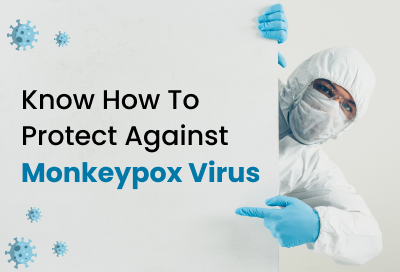
Monkeypox is a rare sickness that is caused by the monkeypox virus. The virus typically affects rodents, such as mice or rats, or nonhuman primates, such as monkeys. But it can happen to people. Monkeypox generally occurs in West and Central Africa. Cases outside of Africa are usually due to international travel, Imported animals, and close contact with an animal or person with monkeypox.
Smallpox vaccinations have proven 85% powerful and effective against monkeypox. The WHO said that mass vaccinations would unlikely be required to fight the spike in cases. But, given the speed of the outbreak and the lack of clarity around its cause, the public health body urged individuals to practice good hygiene to help control its spread.
Symptoms of Monkeypox
Monkeypox symptoms may begin 5 to 21 days after you are exposed. The time between when you are exposed and when you have symptoms is mainly called the incubation period. The symptoms of this virus can last 2 to 4 weeks and may include:
• Fever
• Skin rash
• Headache
• Muscle aches and backaches
• Chills
• Tiredness
• Swollen lymph nodes
A skin rash starts about 1 to 4 days after you begin having a fever. The monkeypox rash often appears on the face, hands, or feet and then spreads to other body parts. The monkeypox rash goes through many different phases. First spots turn into blisters. Then the blisters fill with water and fall off over a time of 2 to 4 weeks. While you have all these symptoms, you can spread this virus. So, from when your symptoms begin until your rash and scabs heal. Consult with doctors at the right time.
How does the monkeypox virus spread?
The virus quickly spreads via close contact with an infected person or animal. Or it can also be spread when a person handles materials such as towels and blankets that have been in touch with someone who has monkeypox.
How to stop spreading the monkeypox virus?
Take these a few steps to prevent infection with or the spread of the monkeypox virus:
• Avoid close communication with individuals who have a rash that looks like monkeypox.
• Avoid handling clothes, sheets, blankets, or other materials that have been in contact with an infected animal or person.
• Isolate people who have monkeypox from healthy people.
• Wash your hands regularly & properly with soap and water after any contact with an infected person or animal.
• Avoid animals that may carry the virus.
How is monkeypox diagnosed?
Because monkeypox is a rare disease, a healthcare provider may first suspect other rash illnesses, such as chickenpox or measles. But swollen lymph nodes mainly distinguish monkeypox from other poxes. To determine monkeypox, your healthcare provider first takes a tissue sample from an open sore (lesion). Then, they send it to a lab testing center for PCR (polymerase chain reaction). Apart from these, you may also require to give a blood sample to check for the antibodies or viruses your immune system makes to safeguard against it.
Individuals who catch monkeypox generally recover within 2 to 4 weeks. The symptoms can also be confused with other illnesses - such as herpes, syphilis, or chickenpox - so it is vital to confirm with a medical professional as soon as possible to save yourself and your family.